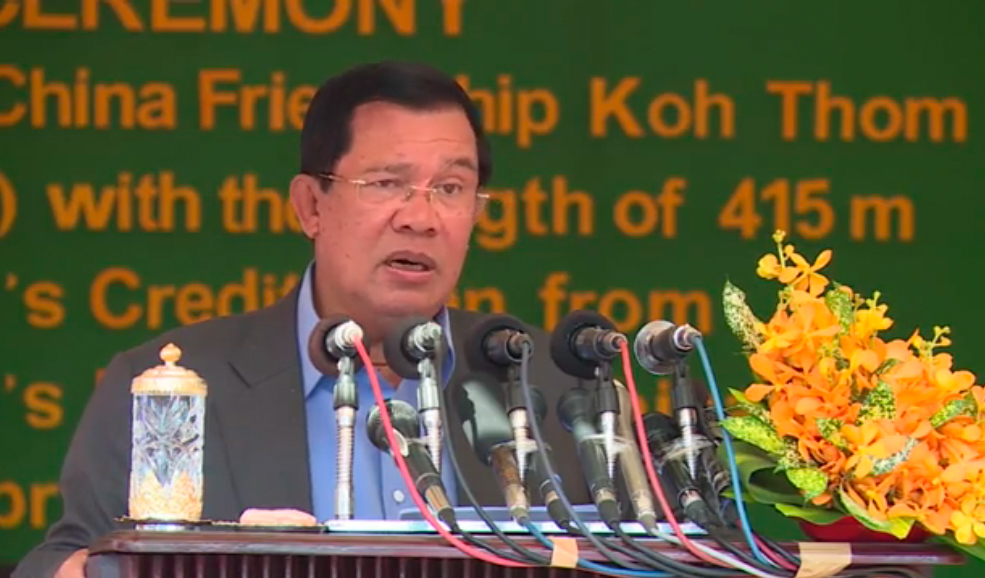
Prime Minister Hun Sen speaks at an inauguration ceremony for the Cambodia-China Friendship Bridge yesterday in Kandal province’s Koh Thom district. Facebook
Prime Minister Hun Sen yesterday made good on promises to file a lawsuit against a political analyst he accused of defamation, while warning in a speech that those who would disturb stability in the country should “prepare the coffin”.
Speaking during the inauguration of the Cambodian-Chinese Friendship Bridge in Kandal province, Hun Sen said he had filed a half-million-dollar lawsuit against analyst Kim Sok – whom he accused of blaming the ruling Cambodian People’s Party for the murder of fellow analyst Kem Ley – and said he had asked the police to monitor him.
“Do not run away, as you have claimed yourself to be a strong person,” he said. “If you do not have money, your house will be sold.”
Yesterday morning, the premier’s lawyer, Ky Tech, filed a complaint alleging incitement and defamation to the court. Hours later, a Phnom Penh Municipal Court deputy prosecutor signed an order prohibiting Sok from leaving the Kingdom and ordering police officers at the borders not to let him cross.
Sok had told Radio Free Asia on Saturday: “All along they have tried to destroy the CNRP, they have killed people, and the latest person killed was Kem Ley.”
Ley was gunned down in July last year, with critics suggesting that the murder was politically motivated.
Sok could not be reached for comment, but on Sunday denied his remarks had been an accusation. Yesterday, he took to Facebook to say that that he did not regret his statement. “What I have done is just . . . to encourage people to advocate for democracy,” he said. According to the court order, Sok must appear for questioning on Friday.
Ou Virak, founder of the think tank Future Forum, said yesterday that the lawsuit against Sok was “definitely a very concerning development, but it has been this way in the past year”.
“People start self-censoring themselves,” he said of such lawsuits’ potential effects. “It’s the best tool of oppression.”
Hun Sen, meanwhile, also used yesterday’s speech to return to a favourite theme, once again warning people not to start a “colour revolution”.
“It means [for them] to prepare the coffin,” he said of those who would participate.
The term “colour revolution” – often used to refer to non-violent movements in the former Soviet bloc – has been used by the government loosely to refer to any protest movement it does not permit, with mentions growing particularly frequent since civil society-backed “Black Monday” protests started last year.
These protests demanded the release of four jailed current and former human rights workers.
Council of Ministers spokesman Phay Siphan yesterday declined to disavow the premier’s apparent threat of violence, insisting that several actors had “staged the Black Monday” in hopes of toppling the government.
He singled out Ou Virak and Pa Ngoung Teang, head of the Cambodian Center for Independent Media, accusing them and the Cambodian Center for Human Rights of acting “under the head of human rights, as independent analysts” to “incite people against the government”.
Siphan previously was a CCHR employee himself. He went on to accuse foreign agents of fomenting a colour revolution, and insisted “our Constitution does not allow anyone to hold illegal demonstrations”. In fact, the Constitution enshrines freedom of assembly and peaceful protest, and the Kingdom’s Law on Demonstrations forbids the restriction of such except for reasons of public safety.
Siphan, however, brushed off international criticism of the suppression of protests. “We care [only] about our own people,” he said.
“Enjoy what you’re doing, but stop at the red line,” he told a Post reporter. “No matter [whether you’re] Cambodian, as well as foreigners,” he added. “Tell all your friends, if you support the colour revolution, prepare your own coffin.”
Siphan also alleged that the government had documents proving the existence of “foreign agents” advocating for colour revolution at The Phnom Penh Post, Radio Free Asia and Cambodia Daily, but declined to name the purported agents.
Chak Sopheap, executive director of CCHR, said in an email yesterday that such comments were “deeply concerning” and “mark[ed] an escalation in the menacing rhetoric” by the government. “It is evident that the authorities are determined to paint peaceful protesters as dangerous subversives who need to be suppressed.”
Ou Virak also pointed to the threatening rhetoric, noting that while people continued to criticise the government, they were increasingly concerned about their and their families’ safety. “It’s very difficult to live a normal life,” he said. “It’s always a constant concern, thinking ‘they could kill you’.”
Political analyst So Chantha, meanwhile, said he has never seen any movement in Cambodia that could lead to a so-called colour revolution, but had noticed a change in people’s mindset in terms of what they expect from their government.
“[People] want something new, they want their rights, and they want development,” he said.
Contact PhnomPenh Post for full article
SR Digital Media Co., Ltd.'#41, Street 228, Sangkat Boeung Raing, Khan Daun Penh, Phnom Penh, Cambodia
Tel: +855 92 555 741
Email: webmasterpppost@gmail.com
Copyright © All rights reserved, The Phnom Penh Post








